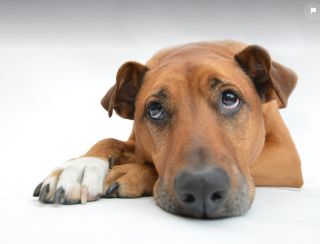Guilt
Do You Suffer Guilt Over Owning a Pet?
Similar to parental guilt, and a trigger of depression and anxiety.
Updated July 25, 2023 Reviewed by Devon Frye
Key points
- While pet-owner guilt is common, it has only recently been studied.
- Many dog owners, for example, felt guilty when they returned to the office after the pandemic.
- Two new studies reported pet owner guilt resembles guilt experienced by parents of young children.
- Pet-related guilt is associated with depression, anxiety, and the conflicting demands of work and pet care.

Did your heart ever break when you dropped your dog off at a boarding kennel as you headed off for a week at the beach? Do you feel bad that your pandemic puppy now spends her days alone because your boss insists you return to working back at the office? Are you conflicted about forcing your cat to spend her life indoors 24/7 when you know she aches to be outdoors chasing mice and small birds?
If so, you are not alone. In a 2021 public opinion poll, over half of respondents admitted that they experienced pet owner guilt.
I recently posted a message on Facebook asking about the guilt associated with owning a companion animal. My request struck a chord: Thirty-three of my pet-loving Facebook friends described incidents they look back on with regret.
Most of the cases, of course, involved dogs and cats. But some of their guilt focused on non-traditional pets—turtles, parrots, a rabbit, a horse, and a lonely six-year-old goldfish. The most frequent sources of guilt among these pet lovers were leaving their companion animals alone, not giving them enough attention, and euthanasia.
Many of the cases were poignant.
- Among three of the women, their guilt was precipitated by the birth of their first child. Miranda, for example, cried for days when she had to rehome her cat because of her newborn baby’s allergies. And Susan wrote, “I constantly feel guilty about the way my relationship with my pets changed because I had children.”
- Edward, a retired business owner, suffers from PTSD which he attributes to the guilt and grief associated with the deaths of the all companion animals he had over the years. “I’m at the point where I can’t bear the thought of getting another dog,” he wrote.
- Simone said she still experiences “horrible guilt” because she did not recognize the symptoms of cancer in her cat early enough for her to be treated.
- Jesse, a bioethicist, wrote, “I feel guilty about something related to my pets every single day.” A recent incident was causing a serious leg injury to her dog while they were playing Frisbee.
- My former student Betty is a psychotherapist who told me she gets teary-eyed every time she has to leave her dog at the kennel.
- Evan’s guilt stemmed from just being a pet owner. “I feel guilty because of the lack of free will for all the animals I have lived with.”
- Jenny is a vegetarian cat owner. She feels guilty when she buys pet food. "I don’t eat animals, but my cat is a carnivore,” she wrote.
New Research on Pet-Owner Guilt
Surprisingly, given its frequency and mental health consequences, with the exception of euthanasia, until recently there has been no research on guilt in pet owners. In 2022, a team led by Dr. Lori Kogan at Colorado State University published the results of the first investigation of pet-related guilt in the journal Animals.
Eighty-five percent of dog owners in the United States and 75 percent of cat owners consider their pets to be family members. Thus the researchers reasoned that pet-related guilt would be similar to guilt experienced by parents of human children—especially as related to the conflicts between child-rearing and work.
Dr. Kogan’s research team recruited 592 American dog owners through a commercial source of research subjects. The participants, who were divided roughly into equal numbers of men and women, completed a series of scales and questionnaires. These included a 10-item Guilt About Dog Parenting Scale, a 21-item Dog Owner Guilt Scale, and a 5-item Work-Dog Conflict Scale (a canine version of a scale that measures work-family guilt experienced by parents of children). In addition, the participants answered questions about their attachment to their dogs and how they dealt with their dog-related guilt.
The results of the study were eye-opening and complex. Here are some of the results I found particularly compelling. (You can read the full text of their paper here.)
How Common Is Pet Owner Guilt, and What Causes It?
Even though the study’s recruiting description did not mention guilt, every participant admitted they experienced some form of guilt related to their canine companions. The researchers used a statistical technique called factor analysis to extract the main categories of the causes of dog-related guilt. The most important were:
- Being away from home (Sample item: “I feel guilty when I go to work.”)
- Insufficient time/attention for pets (Sample item: “I feel guilty when I am too tired to pay attention to my dog.”)
- Pets’ physical health (Sample item: “I feel guilty when I do not run with my dog.”)
- Leaving pets alone (Sample item: “I feel guilty when I leave my dog alone.”)
Further, as the researchers predicted, there were similarities between pet owner guilt and parental guilt. For example, a third of participants significantly struggled with guilt stemming from conflicts between the demands of dog ownership and their occupations. This was especially true of the men in the study and dog owners younger than 50.
How Do Pet Parents Compensate For Their Guilt?
Most of the participants reported changing their behaviors or ways of thinking about pets to help them cope with dog-related guilt. Nearly half of the subjects said they sometimes decline to participate in social events because they felt guilty leaving their dog, and a third of them admitted that, because of guilt, they spent time with their dog at the expense of other family members. Three of four said that reminding themselves their dog has a good life helped them deal with their guilt, and 40 percent were simply resigned to feeling guilty about living with a dog.
Does Pet Owner Guilt Cause Anxiety and Depression?
In 2023, Dr. Kogan’s research team published a follow-up study of pet-owner guilt. In addition to replicating the results of their first study, they examined the relationship between pet guilt, depression, and anxiety.
The subjects in the study were 613 adult dog owners, equally divided between men and women. They completed a 20-item standardized depression inventory and a 21-item anxiety scale as well as the pet owner guilt measures.
The results of this research were consistent with the findings of their 2022 study. Further, as the investigators predicted, individuals with higher guilt about dog parenting tended to have higher anxiety and depression scores. This finding was also true of individuals who experienced guilt related to conflicts between the demands of their jobs and pet parenting.
Dr. Kogan and her colleagues have undertaken groundbreaking studies on “the pet owners’ burden” that sheds light on a facet of human-pet relationships that has been largely ignored.
The importance of the topic was nicely captured by Sophia, a woman who wrote in response to my Facebook query: “So. Much. Guilt!”
Facebook/LinkedIn image: SvetikovaV/Shutterstock
References
Kogan, L. R., Bussolari, C., Currin-McCulloch, J., Packman, W., & Erdman, P. (2022). Disenfranchised guilt—Pet owners’ burden. Animals, 12(13), 1690.
Kogan, L. R., Bussolari, C., Currin-McCulloch, J., Packman, W., & Erdman, P. (2023). Dog owners: Disenfranchised guilt and related depression and anxiety. Human-Animal Interactions, (2023).




